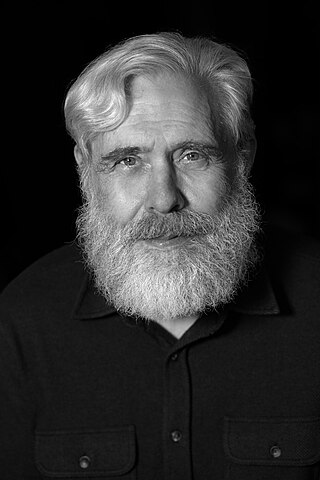Related Research Articles

Biotechnology is a multidisciplinary field that involves the integration of natural sciences and engineering sciences in order to achieve the application of organisms and parts thereof for products and services.

Genetic engineering, also called genetic modification or genetic manipulation, is the modification and manipulation of an organism's genes using technology. It is a set of technologies used to change the genetic makeup of cells, including the transfer of genes within and across species boundaries to produce improved or novel organisms.

Transhumanism is a philosophical and intellectual movement that advocates the enhancement of the human condition by developing and making widely available new and future technologies that can greatly enhance longevity, cognition, and well-being.

Synthetic biology (SynBio) is a multidisciplinary field of science that focuses on living systems and organisms, and it applies engineering principles to develop new biological parts, devices, and systems or to redesign existing systems found in nature.
The philosophy of biology is a subfield of philosophy of science, which deals with epistemological, metaphysical, and ethical issues in the biological and biomedical sciences. Although philosophers of science and philosophers generally have long been interested in biology, philosophy of biology only emerged as an independent field of philosophy in the 1960s and 1970s, associated with the research of David Hull. Philosophers of science then began paying increasing attention to biology, from the rise of Neodarwinism in the 1930s and 1940s to the discovery of the structure of DNA in 1953 to more recent advances in genetic engineering. Other key ideas include the reduction of all life processes to biochemical reactions, and the incorporation of psychology into a broader neuroscience.

The New Atlantis is a journal founded by the social conservative advocacy group the Ethics and Public Policy Center, now published by the Center for the Study of Technology and Society. It covers topics about the social, ethical, political, and policy dimensions of modern science and technology. The journal is editorially reviewed but is not peer-reviewed on scientific topics. It is edited by Ari Schulman, having previously been edited by co-founders Eric Cohen and Adam Keiper.
The Council for Responsible Genetics (CRG) was a nonprofit NGO with a focus on biotechnology.
Gregory Stock is an American biophysicist, best-selling author, biotech entrepreneur, and the former director of the Program on Medicine, Technology and Society at UCLA’s School of Medicine. His interests lie in the scientific and evolutionary as well as ethical, social and political implications of today's revolutions in the life sciences and in information technology and computers.

George McDonald Church is an American geneticist, molecular engineer, chemist, serial entrepreneur, and pioneer in personal genomics and synthetic biology. He is the Robert Winthrop Professor of Genetics at Harvard Medical School, Professor of Health Sciences and Technology at Harvard University and Massachusetts Institute of Technology, and a founding member of the Wyss Institute for Biologically Inspired Engineering at Harvard University.
Linda MacDonald Glenn is an American bioethicist, healthcare educator, lecturer, consultant, and attorney-at-law. Her academic research encompasses the legal, ethical, and social impact of emerging and exponential technologies and "evolving notions of personhood".

Biotechnology is the application of scientific and engineering principles to the processing of materials by biological agents to provide goods and services. From its inception, biotechnology has maintained a close relationship with society. Although now most often associated with the development of drugs, historically biotechnology has been principally associated with food, addressing such issues as malnutrition and famine. The history of biotechnology begins with zymotechnology, which commenced with a focus on brewing techniques for beer. By World War I, however, zymotechnology would expand to tackle larger industrial issues, and the potential of industrial fermentation gave rise to biotechnology. However, both the single-cell protein and gasohol projects failed to progress due to varying issues including public resistance, a changing economic scene, and shifts in political power.
The Institute on Biotechnology and the Human Future (IBHF) is an affiliate of the Illinois Institute of Technology (IIT) and is housed at IIT's Chicago-Kent College of Law. The IBHF was founded in 2004 by Lori Andrews, J.D., and Nigel M. de S. Cameron, Ph.D., to discuss and analyze the ethical, legal, and social implications of biotechnologies.
Maxygen Inc. was a biopharmaceutical company focused on developing improved versions of protein drugs using DNA shuffling and other protein modification technologies. The company was headquartered in Redwood City, CA. It dissolved in 2013. The Maxygen legacy was revived in 2018 with a focus on Directed Evolution of Proteins using Molecular Breeding. Maxygen LLC is currently headquartered in Sunnyvale, CA.
Religious views on genetically modified foods have been mixed, although as yet, no genetically modified foods have been designated as unacceptable by religious authorities.

A genetically modified tree is a tree whose DNA has been modified using genetic engineering techniques. In most cases the aim is to introduce a novel trait to the plant which does not occur naturally within the species. Examples include resistance to certain pests, diseases, environmental conditions, and herbicide tolerance, or the alteration of lignin levels in order to reduce pulping costs.
Kevin M. Folta is a professor of the horticultural sciences department at the University of Florida. From 2007 to 2010 he helped lead the project to sequence the strawberry genome, and continues to research photomorphogenesis in plants and compounds responsible for flavor in strawberries. Folta has been active as a science communicator since 2002, especially relating to biotechnology. He has faced controversy over what his critics say are his industry connections. In 2017 he was elected as a fellow of the Committee for Skeptical Inquiry.

Nediljko "Ned" Budisa is a Croatian biochemist, professor and holder of the Tier 1 Canada Research Chair (CRC) for chemical synthetic biology at the University of Manitoba. As pioneer in the areas of genetic code engineering and chemical synthetic biology (Xenobiology), his research has a wide range of applications in biotechnology and engineering biology in general. Being highly interdisciplinary, it includes bioorganic and medical chemistry, structural biology, biophysics and molecular biotechnology as well as metabolic and biomaterial engineering. He is the author of the only textbook in his research field: “Engineering the genetic code: expanding the amino acid repertoire for the design of novel proteins”.
Since the 1980s New Zealand and Australia have used genetic engineering for different purposes, including the production of food. Each country has faced controversy in this area and used a variety of legal measures to allay concerns and move toward the safe implementation of the technology. As of 2024 many issues requiring ongoing review remain in Oceania, in line with European data that showed "questions of consumer confidence and trust" and negative perceptions of genetically modified food as unhealthy and the technology as a process likely to damage the environment. Australian and New Zealand both require labeling so consumers can exercise choice between foods that have genetically modified, conventional, or organic origins.

Bioconservatism is a philosophical and ethical stance that emphasizes caution and restraint in the use of biotechnologies, particularly those involving genetic manipulation and human enhancement. The term "bioconservatism" is a portmanteau of the words biology and conservatism.
Dhiraj Kumar is a Senior Fellow at the International Centre for Genetic Engineering and Biotechnology (ICGEB) and the leader of the Celular Immunology Team there. He is involved in the study and research on mycobacterium tuberculosis infection. He was awarded the Shanti Swarup Bhatnagar Prize for Science and Technology in Medical Sciences in the year 2019 for his contributions towards better understanding of tuberculosis.
References
- 1 2 3 Henry Barnes (2005). Into the Heart's Land: A Century of Rudolf Steiner's Work in North America. SteinerBooks. pp. 532–536. ISBN 0-88010-554-2.
- ↑ Waldorf Education Research Institute (1999). Research Bulletin 4-6.
- ↑ "What People Are Saying about NetFuture" . Retrieved 2012-08-29.
- ↑ "About the book". The University Press of Kentucky. Retrieved 2 May 2017.
- ↑ Moss, Lenny (2008). "Context, context, context! A delicate empiricism for biotechnology". Nature Biotechnology (26): 991–992. doi:10.1038/nbt0908-991.